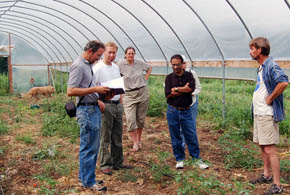Summary
Investigator: Kimberly Williams, Dept. of Horticulture, Forestry and Rec. Res., Kansas State University, Manhattan, KS
Project location: Kansas
Organic producers are relying increasingly on high tunnels (unheated poly-covered greenhouse structures) for season extension and crop protection. Organic production in high tunnels is significantly different compared to organic field production in several ways, including soil and pest management. We propose to develop web-based
information for organic producers who use high tunnels by extending the scope of the leading website for high tunnel information, the widely-accessed www.hightunnels.org, which is a university-sponsored site. Currently, little or no information specific to organic production in high tunnels exists anywhere on the web, even though surveys suggest that 30 to 40% of high tunnels users are organic producers or use organic practices.We have solicited topics about which more information is needed from organic producers on the high tunnels email list (i.e. listserv) associated with the website, have compiled topics from the email list archives, and we propose to solicit prioritization of new content topics from organic producers serving as consultants on this project. Unique web-based resources as well as compilation of high-quality resources that exist on other websites would be organized in ‘Organic production in high tunnels’ sections of hightunnels.org designed ‘For growers’ and ‘For educators’. New content development would included downloadable articles, case studies, and frequently-asked questions associated with special concerns of organic producers in high tunnels. Examples of topics to be addressed are soil quality management, water quality and irrigation delivery systems, fertilization, disease and insect management and site preparation.
Specific project objectives are to:
- Develop web-based content that addresses the needs of organic producers using high tunnels;
- Develop web-based content that can be used by undergraduate and extension educators to teach principles of organic production in high tunnels;
- Disseminate availability of the information by presenting links on appropriate email lists, linking to other organic web resources, and presenting links in the publication Growing for Market.

